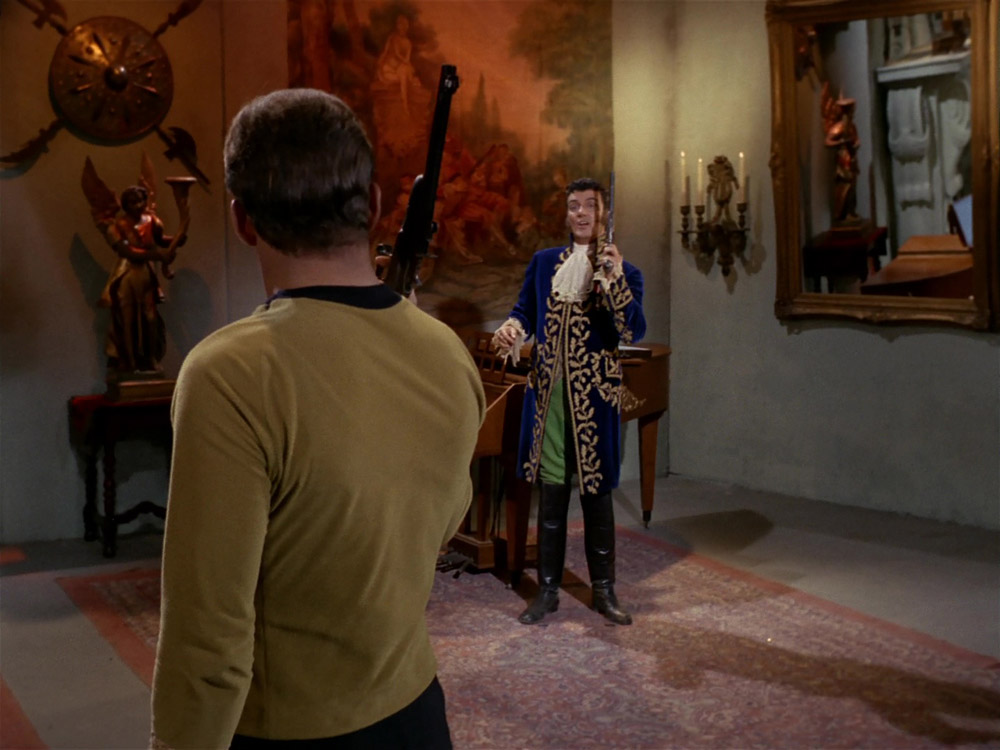Difference between revisions of "dueling"
(Created page with "{{ImageInfoBox2|file=duel-tos18.jpg|caption=A duel ({{TOS18}})}} {{FirstData|TOS18|1967|1|12}} {{Ad|AmazonTOSBD}} |}</div> {{banner|Prime}} Dueling was a method of settling di...") |
m |
||
| Line 4: | Line 4: | ||
|}</div> | |}</div> | ||
{{banner|Prime}} | {{banner|Prime}} | ||
| − | Dueling was a method of settling disagreements, and was usually a fight to the death with {{link|Prime|swords}} or {{link|Prime|pistols}}. Dueling was popular on {{link|Prime|Earth}}<ref name="TOS18"/> from the {{link|Prime|Renaissance}} until the early 19th century, when it was outlawed.<ref name="Concordance"/> {{link|Prime|Trelane}}, who had become obsessed with 19th century Earth, engaged in a duel with {{link|Prime|Starfleet Captain||Captain}} {{link|Prime|James T. Kirk||Kirk}}, using a matched set of pistols that he claimed were identical to those that killed {{link|Prime|Alexander Hamilton}}<ref name="TOS18"/> in his duel with {{link|Prime|Aaron Burr}}.<ref name="Concordance"/> When Captain {{link|Prime|Ron Tracey}} was exposed to the {{link|Prime|Yangs}} of {{link|Prime|Omega III}}, he and Kirk fought a duel according to Yang culture, with the Yangs assuming that Tracey was evil and deserved to lose upon his defeat.<ref name="TOS54"/> | + | Dueling was a method of settling disagreements, and was usually a fight to the death with {{link|Prime|swords}} or {{link|Prime|pistols}}. Dueling was popular on {{link|Prime|Earth}}<ref name="TOS18"/> from the {{link|Prime|Renaissance}} until the early 19th century, when it was outlawed.<ref name="Concordance"/> {{link|Prime|Trelane}}, who had become obsessed with 19th century Earth, engaged in a duel with {{link|Prime|Starfleet Captain||Captain}} {{link|Prime|James T. Kirk||Kirk}}, using a matched set of pistols that he claimed were identical to those that killed {{link|Prime|Alexander Hamilton}}<ref name="TOS18"/> in his duel with {{link|Prime|Aaron Burr}}.<ref name="Concordance"/> When Captain {{link|Prime|Ron Tracey}}'s violation of the {{link|Prime|Prime Directive}} was exposed to the {{link|Prime|Yangs}} of {{link|Prime|Omega III}}, he and Kirk fought a duel according to Yang culture, with the Yangs assuming that Tracey was evil and deserved to lose upon his defeat.<ref name="TOS54"/> |
Dueling also remained a part of {{link|Prime|Vulcans||Vulcan}} culture. In the ''{{link|Prime|koon-ut-kal-if-fee}}'' ritual, a Vulcan man could fight a duel to the death with the champion of his intended bride, should she choose not to follow through with the {{link|Prime|marriage}}, which had been arranged when the pair were children.<ref name="TOS34"/> | Dueling also remained a part of {{link|Prime|Vulcans||Vulcan}} culture. In the ''{{link|Prime|koon-ut-kal-if-fee}}'' ritual, a Vulcan man could fight a duel to the death with the champion of his intended bride, should she choose not to follow through with the {{link|Prime|marriage}}, which had been arranged when the pair were children.<ref name="TOS34"/> | ||
Revision as of 06:22, 5 September 2023
Dueling was a method of settling disagreements, and was usually a fight to the death with swords or pistols. Dueling was popular on Earth[1] from the Renaissance until the early 19th century, when it was outlawed.[2] Trelane, who had become obsessed with 19th century Earth, engaged in a duel with Captain Kirk, using a matched set of pistols that he claimed were identical to those that killed Alexander Hamilton[1] in his duel with Aaron Burr.[2] When Captain Ron Tracey's violation of the Prime Directive was exposed to the Yangs of Omega III, he and Kirk fought a duel according to Yang culture, with the Yangs assuming that Tracey was evil and deserved to lose upon his defeat.[3]
Dueling also remained a part of Vulcan culture. In the koon-ut-kal-if-fee ritual, a Vulcan man could fight a duel to the death with the champion of his intended bride, should she choose not to follow through with the marriage, which had been arranged when the pair were children.[4]
Notes and References
- ↑ 1.0 1.1 Roddenberry, Gene (Executive Producer). "The Squire of Gothos." Star Trek, Season 1, Episode 17 (Production 18). Directed by Don McDougall. Written by Paul Schneider. Desilu Productions, 12 January 1967.
- ↑ 2.0 2.1 Template:RefTOSConcordance
- ↑ Roddenberry, Gene (Executive Producer). "The Omega Glory." Star Trek, Season 2, Episode 25. Directed by Vincent McEveety. Written by Gene Roddenberry. Desilu Productions, 1 March 1968.
- ↑ Roddenberry, Gene (Executive Producer). "Amok Time." Star Trek, Season 2, Episode 5. Directed by Joseph Pevney. Written by Theodore Sturgeon. Desilu Productions, 15 September 1967.

